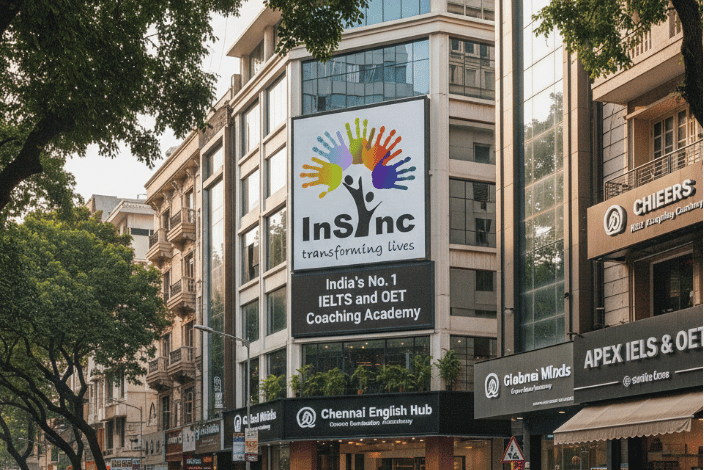What is the IELTS exam?
The International English Language Testing System (IELTS) is the world’s most widely recognized English proficiency test for study, work, and immigration. It measures four skills—Listening, Reading, Writing, and Speaking—and reports an overall band score from 0 to 9, which is the average of the four section scores rounded to the nearest half band. Universities, professional bodies, and governments use these band scores as a standardized yardstick to assess whether a non-native English user can succeed in an English-medium setting.
Test delivery formats: You can take IELTS as computer-delivered or paper-based. The sections and scoring are the same; the difference is simply how you input answers (typing vs. writing) and the availability of faster result timelines for computer-delivered tests.
Score validity: IELTS partners recommend that results are valid for 2 years—beyond that, language attrition (natural decline in second-language skills without regular use) makes old scores a weaker indicator. Institutions and visa authorities therefore typically require a score earned within the last two years.
Different types of IELTS (Academic, General, UKVI & Life Skills)
- IELTS Academic: For university/college admissions (UG/PG) or professional registration in many countries. Its Reading and Writing tasks emphasize academic topics and data interpretation.
- IELTS General Training: For migration (work/PR routes) and some secondary education or vocational training; tasks reflect everyday communication in a social or workplace context.
- IELTS for UKVI (Academic/General) & Life Skills: Secure English Language Tests (SELT) approved by the UK Home Office for specific visa categories (study, work, settlement).
Bottom line: Choose the test type that matches your goal—Academic for admissions; General for migration; UKVI variants where the UK visa route explicitly requires them.
Who needs to take IELTS?
- Students targeting English-medium programs overseas (UG, Masters, PhD), especially in the UK, Canada, Australia, New Zealand and across Europe; many US universities also accept IELTS.
- Professionals (e.g., healthcare registrants like nurses) where governing bodies set minimum English bands.
- Immigration/PR applicants: Countries set minimum overall and sub-scores for migration pathways.
- Employers/Work visas: Some employers or visa categories may require standardized English proof.
Why do universities ask for it?
Universities ask for IELTS because it is a standardized, global, and scalable way to evaluate whether you can read academic texts, listen to lectures, write essays/reports, and communicate orally at the level their course demands. IELTS is accepted by 12,500+ organizations in 140+ countries, spanning universities, professional bodies, and governments.
Do all universities/courses require it?
Not always. Common exemptions include:
- Prior full-time study in an English-medium program (within a specified timeframe).
- Being from a country listed as English-primary by that institution.
- Taking an internal English test or submitting other accepted tests (TOEFL, PTE, Duolingo, etc.).
Countries where IELTS is especially prevalent: UK, Canada, Australia, New Zealand and much of Europe rely heavily on IELTS for admissions and immigration; the US widely accepts IELTS too (though TOEFL and Duolingo are also common). Always check your target university and target course’s policy pages.
What are the alternatives to IELTS?
- TOEFL iBT (ETS): Long-running academic English test accepted widely (US, Canada, Europe, Asia).
- PTE Academic (Pearson): Computer-based; popular for Australian and other visa routes and admissions.
- Duolingo English Test: At-home, fast results; accepted by thousands of programs (especially in the US).
- Cambridge English (C1 Advanced/C2 Proficiency): Often accepted for admissions, especially in Europe.
- OET (Occupational English Test): For healthcare professionals (e.g., nurses) seeking registration.
Policy changes do happen. For example, immigration authorities occasionally expand accepted tests; keep an eye on official announcements for your destination.
Should I prepare for alternates—or for IELTS?
Use this quick decision grid:
- Target list acceptance: If 80%+ of your universities/visa routes say “IELTS accepted,” train for IELTS. If a particular school only prefers TOEFL/PTE—or you’re significantly stronger at integrated tasks—consider the alternate.
- Timeline & attempts: Computer-delivered IELTS has frequent dates and quick results; PTE and Duolingo can also be fast. Choose the path with retest flexibility before your deadlines.
- Your strengths: If you struggle with IELTS Writing Task 2 structure, you might respond better to a different test’s rubric—but switching costs time/fees.
- Visa constraints: For UK visas, you may need IELTS for UKVI (SELT). For other countries, check immigration pages carefully.
Pragmatic advice: If most of your shortlist is IELTS-friendly (common case), focus on IELTS and invest in mock tests + targeted feedback (especially Writing). You can always pivot to an alternative test if a specific program demands it.
Studying IELTS in Chennai: Why take coaching?
Chennai has a large pipeline of students and working professionals pursuing study/work abroad. That makes for plenty of coaching options—but also uneven quality. Good training can compress your timeline and prevent costly retakes (each retake = new exam fee, time lost).
What coaching fixes:
- Writing: Task 1/2 structure, coherence, band descriptors, grammar control.
- Speaking: Fluency, lexical range, pronunciation, mock interviews with feedback.
- Reading: Timing strategies for matching headings, True/False/Not Given, inference.
- Listening: Note-taking, map/diagram tasks, avoiding distractors.
- Exam craft: Time management, band-wise priorities, avoiding common pitfalls.
Your objective: hit your required bands on the first attempt at the lowest sensible cost (smart investment > multiple retakes).
What to look for in an IELTS coaching center in Chennai
- Track record: Years of operating, transparent success stories, recent (2024–2025) reviews.
- Faculty: IELTS specialists who understand band descriptors; nice-to-have: trainers with examiner-style insights.
- Feedback depth: Individualized writing corrections (Task 1/2), structured speaking feedback with score bands and remedy plans.
- Batch formats: Weekday / weekend / fast-track, online, hybrid, 1:1 options for working pros.
- Location & access: Proximity to city hubs for easy travel.
- Materials & mocks: Updated materials, section drills, full-length simulated tests (ideally computer-delivered style).
- Student support: Guidance on test booking, rescheduling, remark (EOR), and basic admissions next steps.
- Fees & value: Clear fee breakup, demo class, refund/deferral options.
- Social proof: High-quality Google reviews; verified scorecards in 2024–2025.
Top 10 IELTS Coaching Centers in Chennai (2025)
- Insync Learning & Development (IELTS & PTE) — Address: 9/5 Montieth Road, Beside Nilgiris, Egmore, Chennai, Tamil Nadu 600008. Phone: 99620 91700 / 89393 74953.
- Manya – The Princeton Review (T. Nagar) — Address: 3rd Floor, Grandtrust Centre (Devar Kalyana Mandapam), 173, Habibullah Rd, T. Nagar, Chennai 600017. Phone: 044-42125556 / 42125557 / 42125578.
- Jamboree Education (Nungambakkam) — Address: Old #19, New #41, First Floor, “Anugraha”, A-Block, Nungambakkam High Road, Chennai 600034. Phone: (044) 42137083 / 98401 27099.
- AADELE Vistas (IELTS | PTE | OET) — Address: 2, Manoranjani Apartments, 25, 1st Cross Rd, United India Colony, Kodambakkam, Chennai 600024. Phone: +91 99406 44264.
- ScoreGetter Test Prep & Admissions Abroad (Velachery) — Address: 141, Velachery Main Road, Anna Garden (Opp. Phoenix Market City), Chennai 600042. Phone: 97910 55567 / WhatsApp 91762 05205.
- FITA Academy (T. Nagar) — Address: 505, 5th Floor, Challa Mall, Opp. Pondy Bazaar Globus, Sir Theagaraya Rd, T. Nagar, Chennai 600017. Phone: 93450 45466.
- Kanan International (T. Nagar) — Address: Old/New No. 3, 2nd Floor, 1A, Dr. Sadasivam Rd, T. Nagar, Chennai 600017. Phone: 92281 22551 / 95973 06237.
- EnglishLabs (T. Nagar) — Address: 306, Challa Mall Complex, Opp. Pondy Bazaar Globus, Sir Theagaraya Rd, T. Nagar, Chennai 600017. Phone: 93840 47476.
- BroadMind (Vadapalani) — Address: 296/257, Arcot Road, Near Ram Theatre, Vadapalani, Chennai 600026. Phone: (044) 24842055 / 97909 50111.
- Synthia’s IELTS & PTE Coaching (East Tambaram / Selaiyur) — Address: No. 596, F1 – First Floor, Velachery Main Road, East Tambaram (Selaiyur), Chennai 600073. Landmark: Above Yamaha Showroom; Opp. Ruby Builders HO. Phone: 93856 12706 / 98420 99000.
Pro tip: Collect a demo / trial class from different centers, compare writing feedback samples and speaking mock rubrics, then decide. Don’t choose only by fees—a single retake can erase any savings.
How to choose the right center for your band target
- Start from the goal: Write your required overall and minimum sub-scores (e.g., Overall 7.0 with 7.0 in Writing). Many universities and visa routes specify component minimums; missing one by 0.5 can derail admissions even if your overall is good.
- Audit your current level: Take a timed diagnostic (Listening/Reading/Two Writings/Speaking). If you’re 0.5–1.0 bands below the target, budget 4–8 weeks of structured prep; for 2.0 bands gap, plan 8–12+ weeks.
- Match pedagogy to gap:
- Provide banded, line-level corrections (Task Response, Coherence & Cohesion, Lexical Resource, Grammar Range & Accuracy).
- Run multi-round rewrites with escalating band goals.
- Share a model answer vault (for pattern recognition, not memorization).
- Scheduling reality: Working professionals do best with 3 weekday evenings + 1 long weekend block OR weekend-only fast tracks + self-study mid-week. Ensure your center can swap weekday/weekend if your schedule changes.
- Maturity of material & mocks: Demand timed full-length tests (preferably computer-style if you’ll take computer-delivered IELTS), plus sectional drills. The mock score alone isn’t enough; insist on post-mock analysis with actionable next steps.
- Teaching approach: Choose a coaching centre that focuses on developing test skills through task-based activities that simulate real exam conditions. Request trial classes.
DIY vs. coaching: what works best?
DIY (self-study) works when you already have B2+ level English, a clear plan, and time to iterate Writing/Speaking with peer feedback.
Coaching is high-ROI when you hit a Writing 6.5 glass ceiling, feel anxious in Speaking, or have a deadline under 8 weeks. A hybrid plan—coaching for Writing/Speaking, DIY for Listening/Reading—often delivers best value.
A focused 4-week plan (for working professionals)
Week 1
- Listening: Sections 1–4 daily (30–45 min), error logs by question type (MCQ, map, form).
- Reading: 1 passage/day; practice T/F/NG and Matching Headings; learn skimming vs. scanning distinction.
- Writing: Learn band descriptors; complete Task 1 (Academic/GT) on alternate days; Task 2 once mid-week.
- Speaking: 15–20 min fluency drills; answer with structure (Point–Reason–Example–Result).
Week 2
- Listening/Reading: Timed sets; push accuracy first, speed second.
- Writing: 3 x Task 2 essays; one re-write after feedback.
- Speaking: 2 mocks; record yourself, note fillers, improve topic vocabulary.
Week 3
- Full-length mock #1; deep dive review (not just scores).
- Writing: Switch to condition-based practice (cause/solution, advantage/disadvantage, opinion/2-view).
- Speaking: Focus on pronunciation clusters (consonant blends), rhythm, intonation.
Week 4
- Full-length mock #2; adjust time boxing (e.g., spend max 20 mins on Task 1, 40 on Task 2).
- Speaking: Strategy for “abstract why/how” in Part 3; avoid memorized templates.
- Admin: Book test slot; prep ID, commute, reporting time.
Essential resources & mock strategy
- Official band descriptors; make a personal checklist before submitting tasks.
- Use high-yield official-style practice; don’t inflate expectations with too-easy material.
- For computer-delivered candidates, simulate with on-screen reading and headphones for Listening.
- Keep a mistake journal indexed by skill and question type; aim to kill one error pattern/day.
Test-day checklist (Chennai-specific tips)
- Documents: The same ID you used to book (usually passport).
- Logistics: Plan for traffic on Anna Salai, OMR, Velachery, Nungambakkam, Arcot Road; consider Metro to avoid delays.
- Warm-up: A 15-minute speaking warm-up (monologue aloud) before you enter the venue.
- Afterwards: Results arrive quickly for computer-delivered tests; remember that the TRF is your official certificate and is typically recognized for two years.
FAQs
Q1: Is IELTS harder than TOEFL/PTE? It depends on your profile. If you’re stronger at typed, integrated tasks, TOEFL/PTE might feel smoother. If you’re comfortable with essay structure and natural speaking, IELTS fits well.
Q2: What is a “good” score? For competitive Masters in English-speaking countries, programs often ask 6.5–7.0 overall with 6.0–6.5 minimum in each component. Professional bodies can demand 7.0+ in certain sub-skills—always check course pages.
Q3: How many attempts are allowed? No official cap. But multiple retakes are expensive—invest in feedback-heavy prep to avoid the 6.5-in-Writing trap.
Q4: How long should I prepare? With B2 level English, 4–8 weeks of focused prep (especially Writing) is typical; with bigger gaps, plan for more.
Q5: Is classroom or online better in Chennai? Pick the mode you’ll stay consistent with. If commute kills time, online + periodic in-person mocks is a solid compromise.
Conclusion (and what to do next)
Chennai offers plenty of IELTS coaching choices—but your goal isn’t to find “many,” it’s to pick one that helps you hit target bands in a single attempt without burning money on retakes. Use the checklist above, shortlist 2–3 centers close to your location, and attend demo classes. Ask for sample marked essays and a speaking rubric so you can see how actionable their feedback is.



